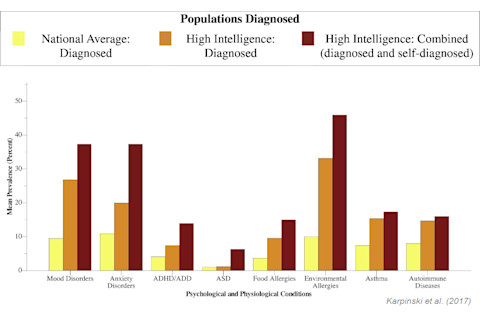A few weeks ago I blogged about the idea that high-IQ people suffer from an inability to communicate with less gifted folk. Now, a new paper claims that very intelligent people are more prone to mental illnesses and allergies.
However, I don’t think the paper is very smart.
Researchers Ruth I. Karpinski and colleagues surveyed the members of American Mensa, a society for people in the top 2% of IQ (IQ 130+). 3,715 Mensans responded to the survey, which asked them whether they were currently diagnosed with various diseases, from depression to asthma. Participants were also asked if they suspect that they might suffer from these conditions.
It turned out that the Mensans reported levels of illness higher than the ‘national average’:

Karpinski et al. make much of these results, putting forward what they call the ‘hyper-brain/hyper-body’ model of high-IQ ‘hypersensitivity’:
The model posits a unique psychoneuroimmunological process such that those with a hyper brain in the form of very superior (at or above 130) cognitive ability lend themselves to a greater tendency to respond to environmental stressors by ruminating and worrying which are positive predictors of risk for psychological overexcitabilities leading to affective disorders.
These disorders are closely associated with a hyper body which manifests in physiological overexcitabilities which take the form of immune and inflammatory dysregulation, which can also bi-directionally instigate psychological effects.
Hmm.
I have a few concerns here. First off, the disease prevalence data in this study were based on self-report of current medical diagnoses – the questions asked whether disorders had been “formally diagnosed by a medical professional.” The baseline, ‘national average’ comparison prevalence rates, however, were not gathered in this way.
The ‘national average’ data in the mood disorders category, for instance, are taken from the NCS-R survey (data collected 2001-2003.) The NCS-R survey did not ask people whether they’d been diagnosed with a mood disorder. Instead, trained interviewers asked participants a series of questions about their mood, emotions, sleep, and other symptoms, and made diagnoses based on strict criteria.
Doctors in the real world don’t diagnose depression the NCS-R way, so we can’t compare the NCS-R estimate of mood disorder prevalence to the estimate of diagnosed prevalence from Karpinski et al.’s survey. It’s comparing Malus and Citrus.

Secondly, I have concerns about the sample. This wasn’t a study of high-IQ people. It was a study of Mensans, a self-selected subgroup of high-IQ people. 6.5 million Americans fall in the top 2% of IQ, and only 55,000 of them are members of American Mensa.
In other words, Mensans make up about 0.8% of high-IQs, and Karpinski et al. have data from less than 10% of Mensans, so the sample is seriously unrepresentative.
The ‘national average’ comparison data, however, were taken from nationally representative American samples. The age, gender, and ethnic demographics of the Mensa respondants differ considerably from the national average.
Even if we take the results of this study at face value, the ‘hyper-brain/hyper-body’ theory is rather horribly simplistic. It reminds me of ancient Greek humorism, or 19th century neurology’s talk of ‘nervous excitement’. The brain is not a gland that just pumps excitement when aroused.













